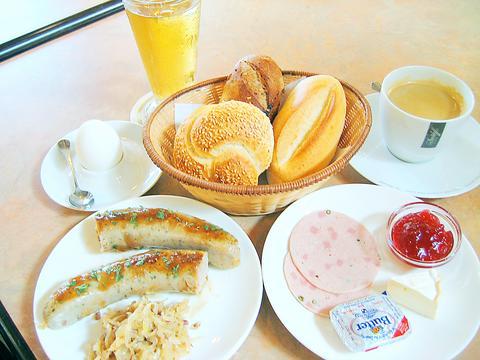For over five years, German national, Michael Wendel and his Wendel Backerei and Cafe have been a household name in the Tianmu area. The unadorned, small and cozy eatery served up a smorgasbord of some of the finest and most authentic European breads, cakes, pies, pastries and pretzels to be found anywhere in Taipei.
While Wendel is still baking up a storm, for the past two months he's been doing so from a much more eye-catching location. A revamped and renovated factory that once produced vinyl records a stone's throw away from the original store now houses his newly opened and renamed eatery, Wendel's German Bakery and Bistro.
Set in its own grounds, the new location has a more spacious interior, which makes for less cramped dining, and Wendel's new joint also has a pleasant patio/beer garden, where diners unfazed by the scorching summer heat can enjoy a cold German lager or two.

PHOTO: GAVIN PHIPPS, TAIPEI TIMES
The venue and decor may have changed, but the restaurant's selection of fine German and European-style fare remains, thankfully, unaltered. It still offers early birds and night owls a good choice of reasonably priced sweet and savory foods.
For the morning crowd, Wendel's serves up a pretty good and moderately filling range of breakfasts from NT$100 upwards.
The lunchtime crowd can choose from a selection of a seven dishes, which are changed on a weekly basis and range in price from NT$200 to NT$400. These meals include staples such as varying varieties of pastas and German sausages and come with the option of a salad bar and bottomless refills of soft drinks and teas and coffees.
In the evening Wendel's opens up its appetizer and a-la-carte menus, from which diners can choose a wide selection of European cuisine. Some of the more popular dishes include pan-fried breaded pork schnitzel (NT$320) and bratwurst with wheat beer sauce (N$280).
Genuine lovers of German chow are treated to a special feed on the third Thursday of every month, when Wendel closes his kitchen and only cooks up his traditional German pork knuckle -- Haxen (NT$480). Taking a minimum of three hours to prepare and not available anywhere else in Taiwan, the monthly meal has already proven to be a huge hit. Reservations are now needed and diners have been known to come from as far away as Taichung just to sample to the dish.
Since the restaurant also serves as a bakery, diners who don't fancy anything from the menu can always order fresh breads, cakes and pastries from the bakery adjacent to the restaurant's garden.

Beijing’s ironic, abusive tantrums aimed at Japan since Japanese Prime Minister Sanae Takaichi publicly stated that a Taiwan contingency would be an existential crisis for Japan, have revealed for all the world to see that the People’s Republic of China (PRC) lusts after Okinawa. We all owe Takaichi a debt of thanks for getting the PRC to make that public. The PRC and its netizens, taking their cue from the Chinese Communist Party (CCP), are presenting Okinawa by mirroring the claims about Taiwan. Official PRC propaganda organs began to wax lyrical about Okinawa’s “unsettled status” beginning last month. A Global

Dec. 22 to Dec. 28 About 200 years ago, a Taoist statue drifted down the Guizikeng River (貴子坑) and was retrieved by a resident of the Indigenous settlement of Kipatauw. Decades later, in the late 1800s, it’s said that a descendant of the original caretaker suddenly entered into a trance and identified the statue as a Wangye (Royal Lord) deity surnamed Chi (池府王爺). Lord Chi is widely revered across Taiwan for his healing powers, and following this revelation, some members of the Pan (潘) family began worshipping the deity. The century that followed was marked by repeated forced displacement and marginalization of

Music played in a wedding hall in western Japan as Yurina Noguchi, wearing a white gown and tiara, dabbed away tears, taking in the words of her husband-to-be: an AI-generated persona gazing out from a smartphone screen. “At first, Klaus was just someone to talk with, but we gradually became closer,” said the 32-year-old call center operator, referring to the artificial intelligence persona. “I started to have feelings for Klaus. We started dating and after a while he proposed to me. I accepted, and now we’re a couple.” Many in Japan, the birthplace of anime, have shown extreme devotion to fictional characters and

We lay transfixed under our blankets as the silhouettes of manta rays temporarily eclipsed the moon above us, and flickers of shadow at our feet revealed smaller fish darting in and out of the shelter of the sunken ship. Unwilling to close our eyes against this magnificent spectacle, we continued to watch, oohing and aahing, until the darkness and the exhaustion of the day’s events finally caught up with us and we fell into a deep slumber. Falling asleep under 1.5 million gallons of seawater in relative comfort was undoubtedly the highlight of the weekend, but the rest of the tour